
Norbert Barthle is a German politician of the Christian Democratic (CDU) who served as a member of the Bundestag from 1998 until 2021, representing Backnang – Schwäbisch Gmünd.

Roderich Kiesewetter is a former Bundeswehr general staff officer and politician of the Christian Democratic Union (CDU) who has been serving as a member of the German Bundestag since 2009.
The German Parliamentary Committee investigation of the NSA spying scandal was started on March 20, 2014, by the German Parliament in order to investigate the extent and background of foreign secret services spying in Germany in the light of the Global surveillance disclosures (2013–present). The Committee is also in search of strategies on how to protect telecommunication with technical means.

Operation Eikonal is a collaboration between the National Security Agency (NSA) and Bundesnachrichtendienst (BND) for the sharing of telephony and internet data captured in Germany. It is based on an agreement that dates to 2002, and is part of the NSA operation "RAMPART-A". Surveillance started in 2003, telephony data was collected from 2004 onwards, and all internet traffic from the Deutsche Telekom (DT) switching center in Frankfurt was captured starting in 2005.
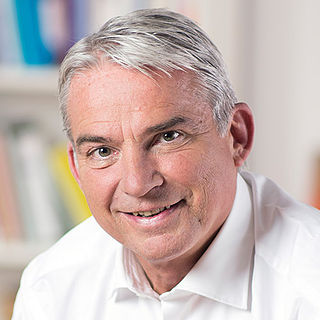
Thomas Strobl is a German politician of the Christian Democratic Union (CDU) who has been serving as Deputy Minister-President of Baden-Württemberg since 2016.

Burkhard Lischka is a German lawyer and politician of the Social Democratic Party of Germany (SPD) who served as a member of the Bundestag from 2009 until 2019.
The Parliamentary Oversight Panel (PKGr) is a committee of the German Bundestag responsible for oversight of the intelligence agencies of Germany. The PKGr monitors the Federal Intelligence Service, the Military Counterintelligence Service, and the Federal Office for the Protection of the Constitution. Under the Control Body Act, the federal government is obliged to inform the PKGr comprehensively about the general activities of the federal intelligence services and about events of particular importance.

Patrick Ernst Hermann Sensburg is a German lawyer and politician of the Christian Democratic Union (CDU) who served as a member of the German Parliament from 2009 until 2021, representing the Hochsauerlandkreis constituency in North Rhine-Westphalia.

Armin Schuster is a German politician. A member of the Christian Democratic Union (CDU), Schuster has been serving as State Minister of Internal Affairs in the government of Minister-President Michael Kretschmer since 2022.
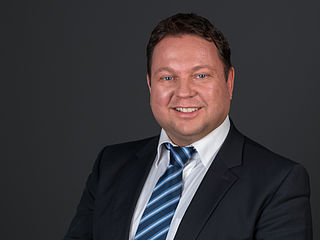
Martin Gerster is a German politician of the Social Democratic Party (SPD) who has been serving as a member of the Bundestag from the state of Baden-Württemberg since 2005.
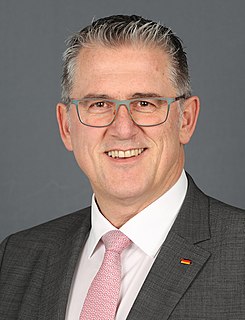
Michael Donth is a German politician of the Christian Democratic Union (CDU) who has been serving as a member of the Bundestag from the state of Baden-Württemberg, Germany, since 2013.

Markus Grübel is a German politician of the Christian Democratic Union (CDU) who has been serving as a member of the Bundestag from the state of Baden-Württemberg since 2002.

Nikolas Löbel is a German politician of the Christian Democratic Union (CDU) who served as a member of the Bundestag from the state of Baden-Württemberg from 2017 to 2021. He resigned in March 2021.

Karin Maag is a German politician of the Christian Democratic Union (CDU) who has been serving as a member of the Bundestag from the state of Baden-Württemberg since 2009.
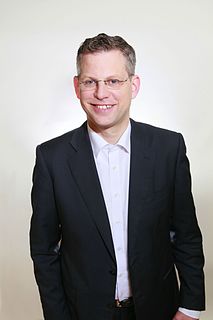
Christoph de Vries is a German politician of the Christian Democratic Union (CDU) who has been serving as a member of the Bundestag from the state of Hamburg since 2017.
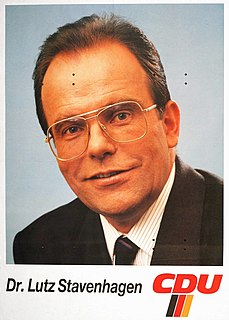
Lutz-Georg Stavenhagen was a German politician and member of the Christian Democratic Union of Germany (CDU). He was Minister of State in the Foreign Office from 1985 to 1987 and Minister of State in the Federal Chancellery from 1987 to 1991.

Bernd Schmidbauer is a former German politician and member of the Christian Democratic Union of Germany (CDU).

Michael Hartmann is a German politician and member of the Social Democratic Party of Germany (SPD). He was a member of the German Bundestag from 2002 to 2017. Hartmann is a specialist politician for internal security and was the domestic policy spokesman of the SPD parliamentary group as well as the chairman of his parliamentary group in the Committee on Internal Affairs and a member of the Parliamentary Oversight Panel.

The Consolidated Intelligence Center in Wiesbaden, Germany, is a controversial US intelligence facility under construction by the US Army Europe, located on the grounds of the Lucius D. Clay Barracks in Wiesbaden-Erbenheim, formerly Wiesbaden Army Airfield, about eight kilometres southeast of downtown Wiesbaden. The purpose of the facility, according to the US Army, is to support US forces with tactical theatre-of-war support and strategic intelligence functions. As such, it is implied that data fusion would also take place at this location.
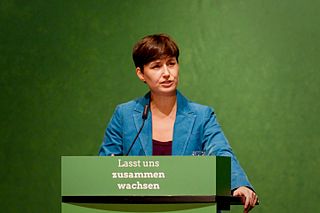
Sandra Detzer is a German politician of the Alliance 90/The Greens who has been serving as Member of the Bundestag since the 2021 elections, representing the Ludwigsburg district.


















